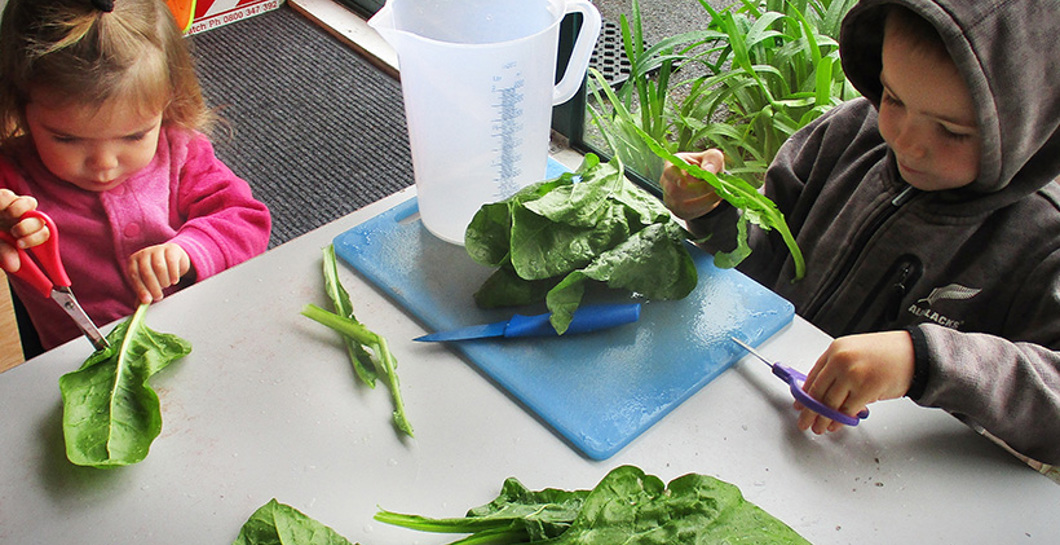Pakuranga Baptist Kindergarten

Preparing plant-based recipes with our youngest learners
Pakuranga Baptist Kindergarten has been on a sustainability journey for many years, led by passionate head teacher Jacqui Lees. Prior to 2023, the early childhood education (ECE) centre had introduced composting to complement their recycling efforts, and had successfully implemented a system for using and laundering reusable nappies, wipes, and face cloths. Their waste reduction was so successful, that for a period of time they were able to do away with their landfill waste collection altogether, occasionally using the neighbouring church’s bin.
Through a Howick local board waste grant, Jacqui also worked with specialist Nigel Zhang to understand the ECE centre’s emissions profile. This involved finding invoices from utility bills, surveying staff about their commute and plugging the numbers into a calculator to estimate the emissions from energy, water, waste, and transport. Nigel and Jacqui also examined the possible carbon sequestration through the native planting the kindergarten had done around the local estuary.
When the Mana Ora programme began, Jacqui decided to channel her sustainability efforts in a new direction. Three key factors fed into her planning – observations of the cost-of-living crisis, knowledge of the lower carbon profile and lower costs of plant-based diets, and a belief in the power of gardening for health and food sovereignty.
“Food is jolly expensive. We wanted to see if we could influence our families not only to try more vegetarian meals, but also to learn how to grow simple things in their gardens.” - Jacqui Lees
Jacqui was also aware of gardening and cooking programmes that operate in many primary schools and was curious about adapting this concept for younger learners. Her project was an experiment to see what kinds of vegetarian dishes she could create on-session with three- and four-year-old children, using produce grown in the ECE centre’s vegetable garden.
To get some baseline information, Jacqui surveyed whānau to see how many families were already gardening at home as well as how frequently they ate vegetarian or vegan meals. Her ultimate aim was to influence cooking practices in whānau households by sharing a series of simple vegetarian recipes in a cookbook. But it didn’t stop there – she envisaged the cookbook idea could be replicated in other ECE centres within their own communities.
After receiving her grant from the Mana Ora Climate Action Fund, the next step was to purchase materials for the garden. This included raised garden beds, a compost tumbler, plants and seeds.
In terms two and three, the project was brought to life, with an abundance of broccoli, spinach, kale, and silverbeet filling the beds. The team of teachers worked together to involve the children in tending the plants and learning to compost.

A dozen vegetarian recipes were created and sampled on session, including spinach and cheese scones, mixed vegetable fritters, spinach pancakes, kale chips, green smoothies and juices, apple juice, lemonade, beetroot hummus and crackers.

The cookbook concept is still forthcoming, but recipes are regularly shared with parents and caregivers through weekly emails.

For many children, the gardening and food preparation has been particularly engaging. Elisha, a 3 year old, loves to put on butterfly wings and to flutter down to the garden. As Jacqui explains “It is her happy place. She is fascinated by the way everything is growing and changing, particularly the broccoli. Yesterday we made kale chips, and she loved cutting the spine off the kale with scissors – it combined two things she loves, scissors and veges. Then she got others to cut up the spines into tiny pieces to feed to the worm farm”.
Sustainable Schools advisor Cate Jessep has been instrumental in the kindergarten’s sustainability journey. As Jacqui says, “Without her support, we wouldn’t have even begun this journey. She’s been a constant source of advice and support and has connected us to many helpful experts.”

In a delightful twist, the project has nurtured a reciprocal relationship between the ECE vegetable garden and whānau. At Matariki, the teachers started sending seedlings home with children to plant in their own gardens, but also invited whānau to bring in vegetables from their gardens. More recently, children have been bringing in their favourite recipes from home to create on session.
“The difference you can make with children at this age is much smaller than when you involve the whole family. We are trying to bring our families along on each step of the journey so they can evaluate their own environmental impact”. - Jacqui Lees
Did you know that eating meat-free one day per week can save approximately 78kg of carbon over a year? Learn more.



